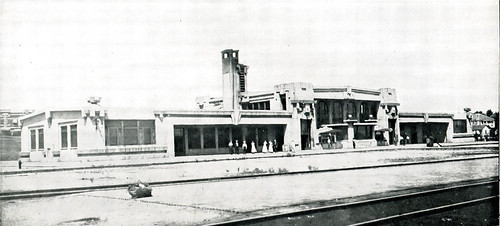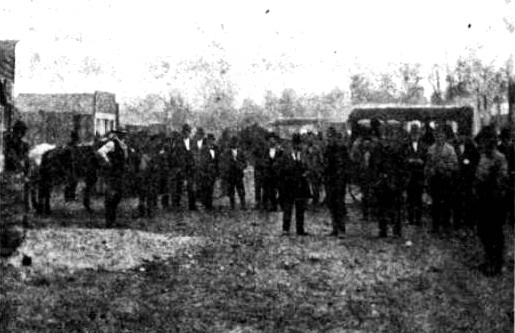We would be remiss if we did not mention the recent Joplin Museum Complex proposal that was defeated at the polls.
Yesterday, Joplin held its spring election and arguably the most contentious item on the ballot was Proposition A, which if passed would have created a sales tax to fund a $7 million dollar renovation of Memorial Hall to serve as the new home of the Joplin Museum Complex. The sales tax would have indefinitely continued at a lower rate to perpetually support the museum. The proposal was voted down.
According to the Joplin Globe, the vote was 3,882 to 928, a four to one margin. While we here at Historic Joplin believe that the museum complex could do with a new home, we agree with the result of the vote. There are several reasons why.
First, it was a poor decision to spearhead a sales tax proposal during the recent recession. Although many economists believe the country is recovering from the recent economic downturn, folks on Main Street are still feeling the pain of difficult times. A new museum complex is the least of someone’s worries who is struggling to pay for healthcare, food, and other necessities. Simply put, it’s hard to justify passing a new tax on people who are struggling to survive on a daily basis.
Second, the PR campaign was mediocre at best. The Globe, which seemed to support the museum proposal, attempted to publicize both sides of the debate. The museum, however, failed to articulate to the public why it matters. Talking about the museum’s multi-million dollar collection of lead and zinc samples does not translate with folks. It does not inspire passionate debate. In the end, the museum failed to carry its message to the people, let alone sell it.
Third, the museum awkwardly proposed taking over Memorial Hall. Why? It appears that “museum representatives” decided upon Memorial Hall and drew up plans without even consulting the public. Some of the endorsements on its website are questionable, even dubious at best, such as the “National Cookie Cutter Historical Museum,” and the “Joplin Historical Society.” It is our understanding that the National Cookie Cutter Museum is part of the Joplin Museum Complex as is, or was, the Joplin Historical Society. Essentially, two organizations that are part of the museum were supporting the museum proposal — isn’t that a conflict of interest?
Fourth, we here at Historic Joplin have conducted research in many of the finest archives and libraries in the world such as the Bodleian Library at Oxford; National Archives I and II in Washington, D.C. and College Park, Maryland; the Library of Congress; the special collections of the University of Oklahoma, the University of Missouri, and the University of Arkansas; numerous state archives and county courthouses; as well as small town libraries and museums. We can say that we have always had a pleasant experience save for interactions with the Joplin Museum Complex.
The Joplin Museum Complex does not allow members of the public access to its collections which is extremely unfortunate. Excuses are made that the museum is simply unable to accommodate visitor requests for access to the museum’s collection. This is unacceptable. Dorothea B. Hoover is rolling in her grave. Years ago, the University of Arkansas Museum was shuttered and the multi-million dollar collection placed in storage. Although housed in a very small space, the university museum collection is readily accessible to the public and is cared for by professional museum staff.
We cannot say the same of the Joplin Museum Complex (JMC). The photo in the recent Globe article on the museum shows that the Joplin Museum Complex collection has not been taken care of by the museum staff. Even if the conditions are not ideal, there is no excuse for sloppy storage methods, although the JMC staff members are not professionally trained curators or archivists. Out of the many libraries, museums, and archives we have visited over the years, this is the first time we encountered such an unhelpful staff. It is unacceptable that members of the public are denied access to museum collections when it is funded by taxpayer money.
So here are our suggestions for improvement:
First, the next time the Joplin Museum Complex embarks on a fundraising campaign, it must articulate its message. Tell the public why its collections matter. Sell it like Sam Walton sold cheap underwear back in the 1970s.
Second, the Joplin Museum Complex should get rid of collections that have nothing to do with the history of Joplin such as the Cookie Cutter collection in order to create adequate storage space. In the museum world, this is called “deaccessioning.” Every museum will deaccession something in its lifetime, particularly items that do not fit with the museum’s mission. Is the Cookie Cutter collection relevant to the history of Joplin? Probably not. So get rid of it. Focus on the real treasures in the collection. This should alleviate some of the storage problems.
Third, please change exhibits as time and money allows. The Joplin Museum Complex has not changed since I was in the third grade. Consider not allowing an animal to run around the museum as they can damage and ruin museum artifacts. No museum staff worth its salt lets live animals have free reign inside of a museum.
Fourth, consider the Union Depot. We realize it is a shell of a building. We have read that the basement has water problems. It is, however, an architectural jewel waiting to be reclaimed. The Joplin Museum Complex could have gotten a lot of support from the numerous voters who want to see the Union Depot restored to its former glory. Forget the basement. Pour concrete in the basement for all we care. Any architect worth his or her drawing board can come up with architectural additions that will compliment Union Depot’s fabulous design. Incidentally, it was in the Kansas City Bottoms where Union Depot sits, where some of Joplin’s first lead mines were established. Think of how relevant that is to the history of Joplin — what better location to preserve and explain the history of Joplin and its rough and tumble beginnings? Plus, the Joplin Museum Complex would be a hero for saving the depot.
Fifth, contemplate hiring someone to serve as museum director who has demonstrated experience in fundraising, community relations, and who preferably has a master’s degree in museum studies.
Comments? Thoughts? Let us know.





